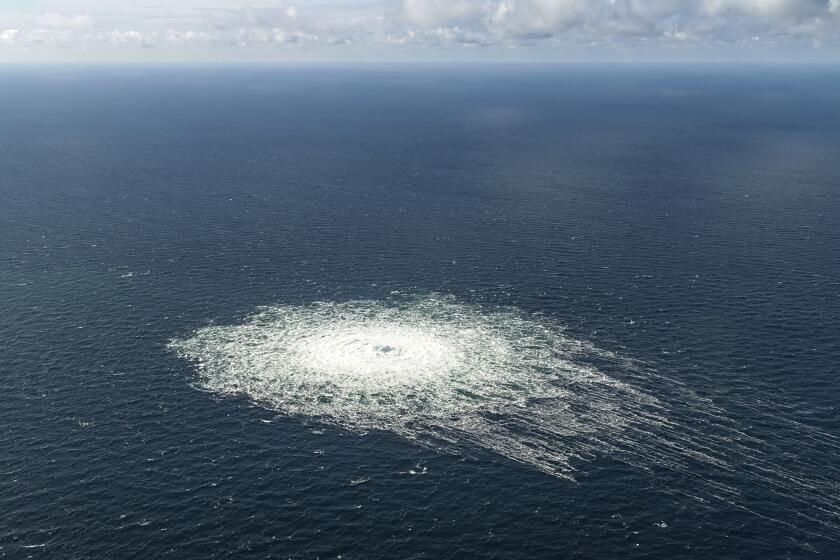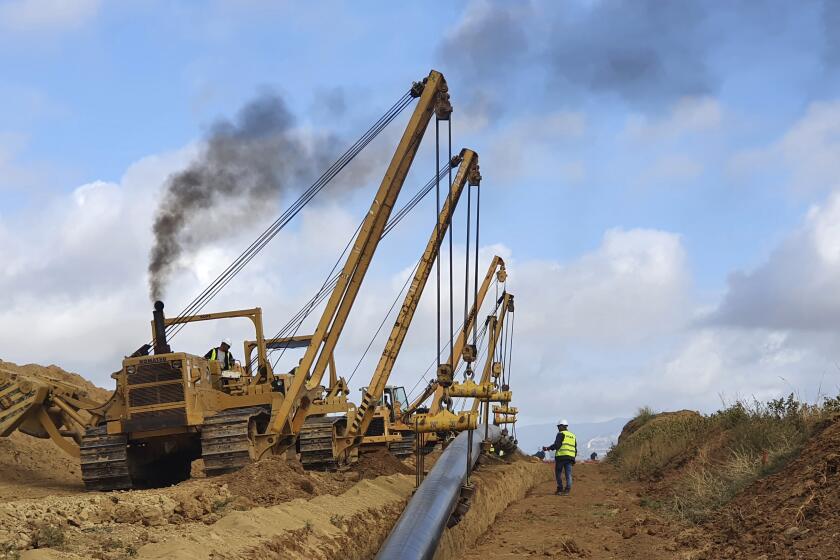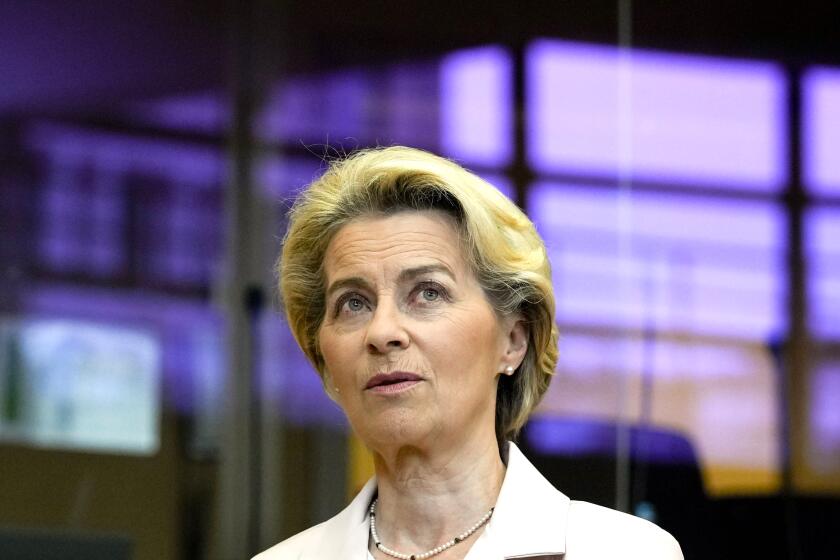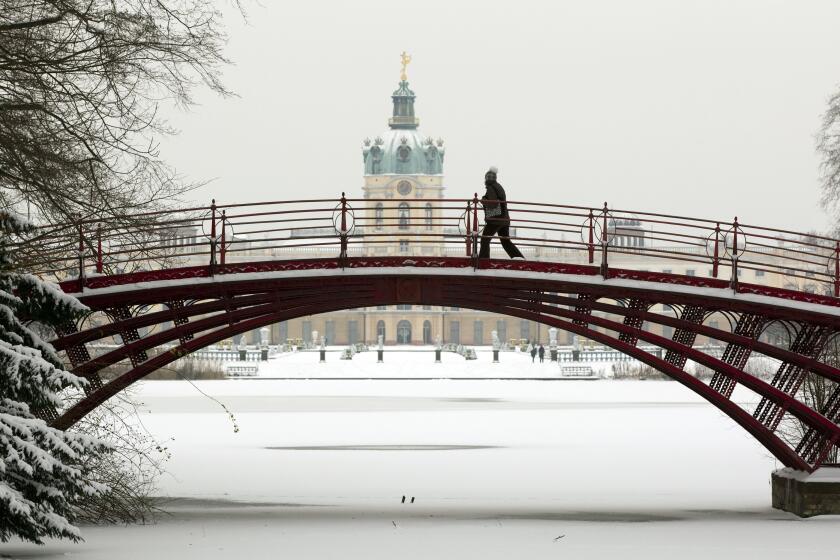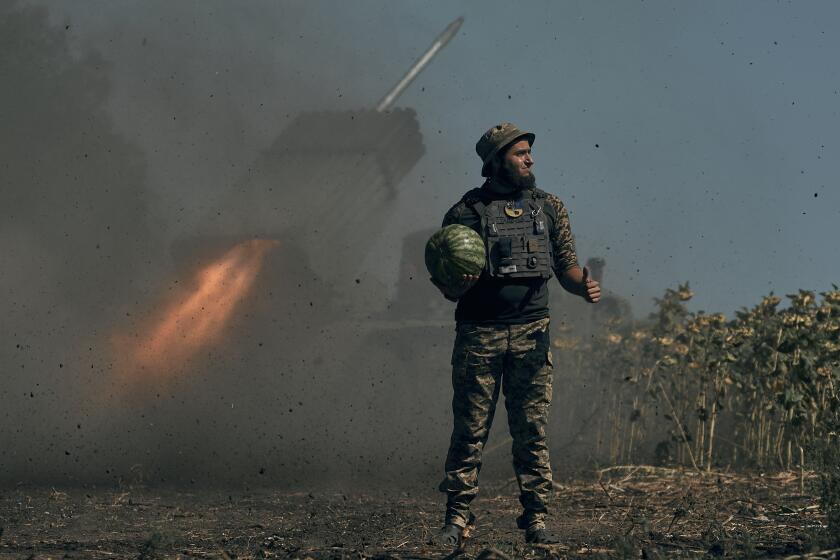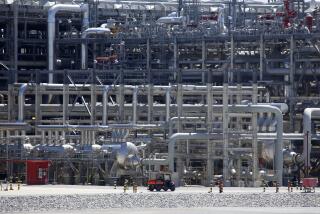Europe turns to Africa in a bid to replace Russian natural gas
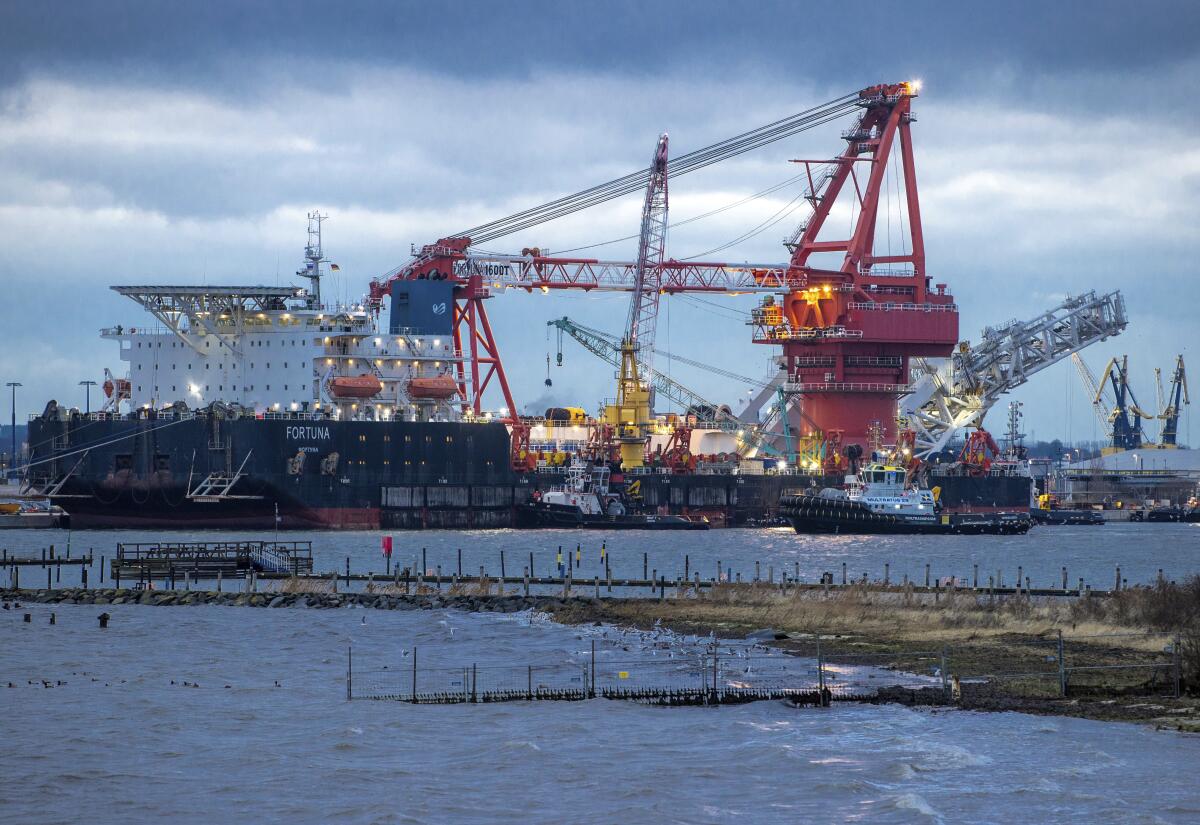
- Share via
DAKAR, Senegal — A new liquefied natural gas project off Africa’s western coast may be only 80% complete, but already the prospect of a new energy supplier has drawn visits from the leaders of Poland and Germany.
The initial gas field near Senegal and Mauritania’s coastlines is expected to contain about 15 trillion cubic feet of gas, five times more than what gas-dependent Germany used in all of 2019. But production isn’t expected to start until the end of next year.
That won’t help solve Europe’s current energy crisis, which was triggered by Russia’s war in Ukraine. Still, Gordon Birrell, an executive for project co-developer BP, says the development “could not be more timely” as Europe seeks to reduce its reliance on Russian natural gas to power factories, generate electricity and heat homes.
“Current world events are demonstrating the vital role that [liquid gas] can play in underpinning the energy security of nations and regions,” he told an energy industry meeting in West Africa last month.
Though Africa’s natural gas reserves are vast and North African countries like Algeria have pipelines already linked to Europe, a lack of infrastructure and security challenges have long stymied producers in other parts of the continent from scaling up exports. Established African producers are cutting deals or reducing energy use so that they have more to sell to boost their finances, but some leaders warn that hundreds of millions of Africans lack electricity and that supplies are needed at home.
Nigeria has Africa’s largest natural gas reserves, said Horatius Egua, a spokesman for the country’s petroleum minister, though it accounts for only 14% of the European Union’s imports of liquefied natural gas, or LNG, that comes by ship. Projects face the risk of energy thefts and high costs. Other promising countries such as Mozambique have discovered large gas reserves, only to see projects delayed by violence from Islamic militants.
Europe is staring down a winter energy crisis.
Europe has been scrambling to secure alternative sources as Moscow has reduced natural gas flows to EU countries, triggering soaring energy prices and growing expectations of a recession. The 27-nation EU, whose energy ministers met this week to discuss a gas price cap, is bracing for the possibility of a complete Russian cutoff but has still managed to fill gas reserves to 90%.
European leaders have turned to countries such as Norway, Qatar and Azerbaijan and especially to those in North Africa, where Algeria has a pipeline running to Italy and another to Spain.
Italy signed a $4-billion gas deal with Algeria in July, a month after Egypt reached an agreement with the EU and Israel to boost sales of LNG. Angola also has signed a gas deal with Italy.
Though an earlier agreement allowed Italy’s biggest energy company to start production at two Algerian gas fields this week, it wasn’t clear when flows would start from the July deal because it lacked specifics, analysts said.
The EU suspects that damage to two underwater pipelines carrying gas from Russia was the result of sabotage.
African leaders including Senegalese President Macky Sall want their countries to cash in on these projects even as they’re dissuaded from pursuing fossil fuels. They don’t want to export it all, either: An estimated 600 million Africans lack access to electricity.
“It is legitimate, fair and equitable that Africa, the continent that pollutes the least and lags furthest behind in the industrialization process, should exploit its available resources to provide basic energy, improve the competitiveness of its economy and achieve universal access to electricity,” Sall told the United Nations General Assembly last month.
Algeria is a major supplier — it and Egypt accounted for 60% of the natural gas production in Africa in 2020 — but it can’t match Russian gas to Europe at this stage, said Mahfoud Kaoubi, a professor of economics and a specialist in energy issues at the University of Algiers.
“Russia has an annual production of 270 billion cubic meters [9.53 trillion cubic feet] — it’s huge,” Kaoubi said. “Algeria is 120 billion cubic meters [4.24 trillion cubic feet], of which 70.5% is intended for consumption on the internal market.”
A new pipeline across a remote border area of Greece and Bulgaria will give some Eastern European countries greater access to the global gas market.
This year, Algeria is forecast to have piped exports of 1.12 trillion cubic feet, according to Tom Purdie, a Europe, Middle East and Africa gas analyst with S&P Global Commodity Insights.
“The key concern here surrounds the level of production step-up that can be achieved and the impact domestic demand could have,” given how much gas Algeria uses at home, Purdie said.
Cash-strapped Egypt also is looking to export more natural gas to Europe, even regulating air-conditioning in shopping malls and lights on streets to save energy and sell it instead.
Prime Minister Mostafa Madbouly says Egypt hopes to bring in an additional $450 million a month in foreign currency by rerouting 15% of its domestic gas usage for export, state media reported.
Start your day right
Sign up for Essential California for the L.A. Times biggest news, features and recommendations in your inbox six days a week.
You may occasionally receive promotional content from the Los Angeles Times.
More than 60% of Egypt’s natural gas consumption still is used by power stations to keep the country running. Most of its LNG goes to Asian markets.
A new three-party deal will see Israel send more gas to Europe via Egypt, which has facilities to liquefy it for export by sea. The EU says it will help the two countries increase gas production and exploration.
In Nigeria, ambitious plans have yet to yield results despite years of planning. The country exported less than 1% of its vast natural gas reserves last year.
A proposed 2,734-mile-long pipeline that would take Nigerian gas to Algeria through Niger has been stalled since 2009, mainly because of its estimated cost of $13 billion.
While the 15% cuts in gas use would be voluntary, the European Commission asked for the power to impose mandatory reductions if necessary.
Many fear that even if completed, the Trans-Sahara gas pipeline would face security risks, similar to Nigeria’s oil pipelines, which have come under frequent attacks from militants and vandals.
The same challenges would hinder increased gas exports to Europe, said Olufola Wusu, a Lagos-based oil and gas expert.
“If you look at the realities on ground — issues that have to do with crude oil theft — and others begin to question our ability to supply gas to Europe,” he said.
Wusu urged pursuing LNG, calling it the “most profitable” gas strategy so far.
Soaring inflation and energy costs, aggravated by the Russian war on Ukraine, erode living standards and test the union’s political will.
Even that isn’t without issues: In July, the head of Nigeria LNG Ltd., the country’s largest natural gas firm, said its plant was producing at just 68% of capacity, mainly because its operations and earnings have been stifled by oil theft.
In the south, Mozambique is due to become a major exporter of LNG after significant deposits were found along its Indian Ocean coast in 2010. France’s TotalEnergies invested $20 billion and started work to extract gas that would be liquefied in a plant it was building in Palma, in the northern Cabo Delgado province.
But Islamic extremist violence forced TotalEnergies to indefinitely suspend the project last year. Mozambican officials have pledged to secure the Palma area to allow work to resume.
Italian firm Eni, meanwhile, pressed ahead with plans to pump and liquefy some of its gas deposits discovered in Mozambique in 2011 and 2014. Eni established a platform in the Indian Ocean 50 miles offshore.
Energy problems have plagued Ukraine and Europe, and much of the Ukrainian region that’s home to a nuclear power plant was reported in blackout.
It’s the first floating LNG facility in the deep waters off Africa, Eni says, with gas liquefaction capacity of 3.4 million tons per year.
The platform liquefied its first gas Oct. 2, according to Africa Energy, and the first shipment is expected to depart for Europe in mid-October.
More to Read
Sign up for Essential California
The most important California stories and recommendations in your inbox every morning.
You may occasionally receive promotional content from the Los Angeles Times.

